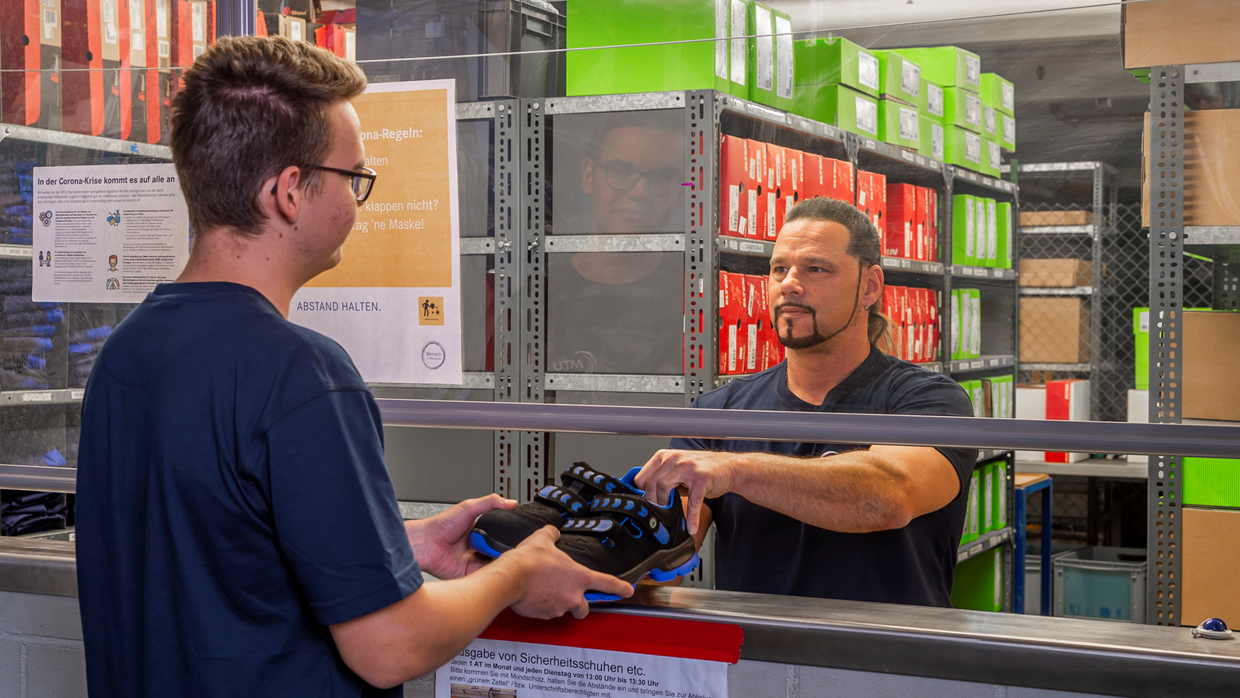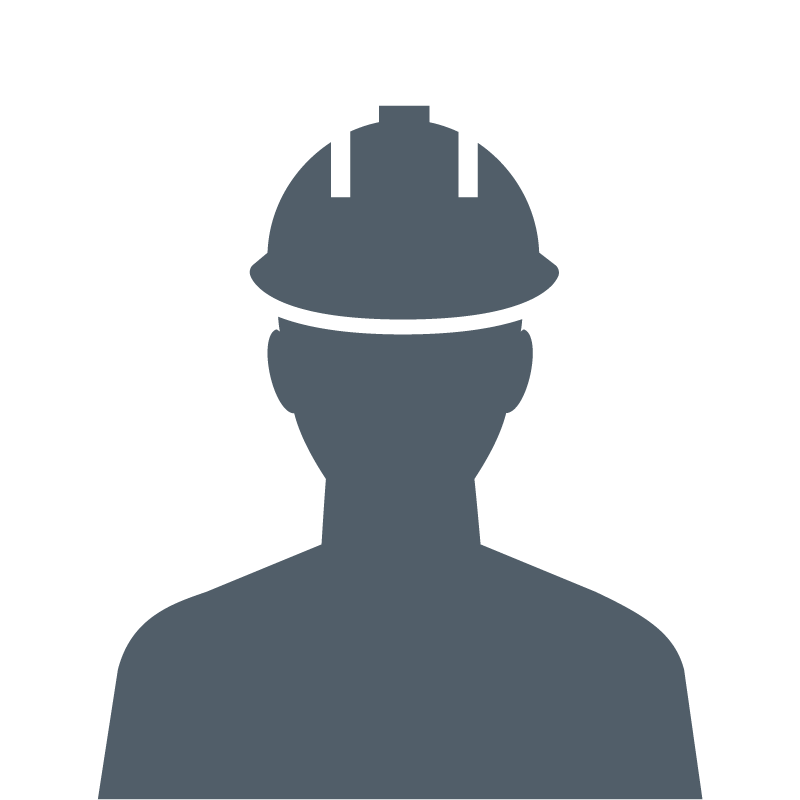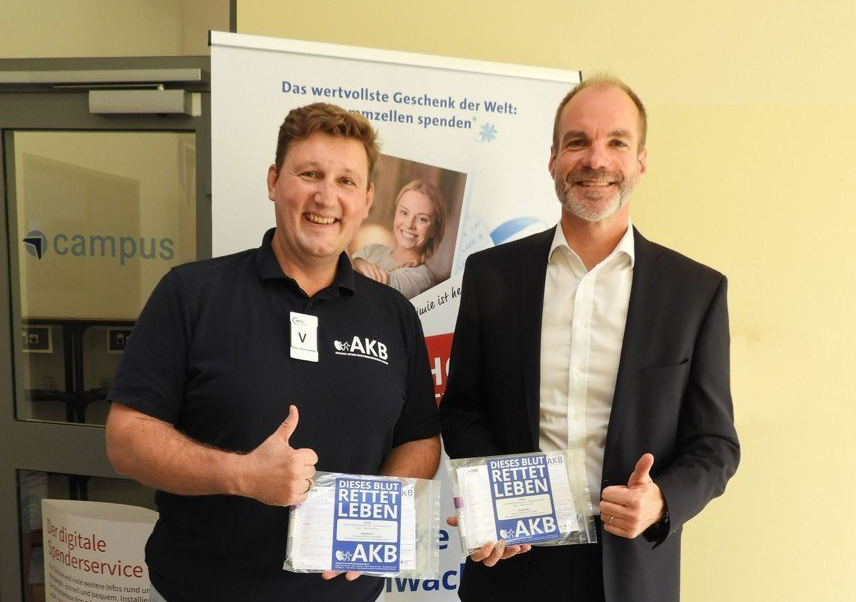Employees
Adequately protecting employees
Occupational health and safety
At MTU, our employees should have a safe and healthy environment in which to work. This is in line with our social responsibility and is expressed in strict occupational safety standards, company health management and a preventive approach.

Personal protective equipment is important for occupational safety. This includes protective shoes, protective goggles and hearing protection, all provided by MTU.
MTU places great importance on the safety of its employees. Occupational safety and employee health are enshrined as one of the key principles of corporate social responsibility in MTU’s Group-wide Code of Conduct, which stipulates that workplaces must be set up in accordance with statutory and generally recognized occupational health and safety regulations. In addition, we have established an internal standard that lays down parameters, rules and KPI definitions applicable across all sites. A Group report on workplace accidents is submitted to the Executive Board each quarter. Our occupational safety approach is not centralized; local implementation addresses the requirements at each site. At the individual production sites, occupational safety is the responsibility of the site managers; responsibility for this lies with appointed managers. Local technical departments take action on occupational safety issues on-site and report regularly to their site management. The workforce at the company’s production sites in Germany, Poland and Canada is represented in locally organized occupational safety committees, the composition of which includes employee representatives.
Occupational safety forms part of our integrated management system (IMS) policy and is regularly reviewed and improved. At the European production sites, workplace regulations that are mandatory for all employees contain important safety rules pertaining to accident prevention, fire protection and what to do in the event of workplace or commuting accidents.
Certified occupational safety management
The occupational safety management systems in place at the German sites are certified externally in accordance with the ISO 45001 international standard for occupational health and safety management systems. → MTU’s current certifications All workspaces in the company are part of our IMS based on the principle that “safety takes priority in what we do.” This includes the workspaces occupied by temporary workers, who are included in occupational safety measures in the same way as permanent employees. A management system based on the ISO 45001 standard has been established at the new production site in Serbia, which started operations at the end of 2022.
We strive to prevent health and safety risks to our employees and third parties. Workplaces are regularly assessed for any risks and hazards they present for employees. If potential burdens or hazards are identified, we take measures to eliminate them or reduce them to a minimum.
With the aim of permanently reducing the number of accidents and reaching a level of safety that aspires to prevent any accidents whatsoever, the local occupational safety officers record all accidents according to uniform categories (categories 1–5, near miss to fatal accident) and investigate them together with the affected employees / temporary workers and their manager. Should the assessment reveal specific aspects pertaining to the cause of accidents, we will take further steps to increase safety precautions. In the same way, near misses are recorded and evaluated. We strongly encourage the workforce to report unsafe situations. Safety training at least once a year is mandatory for all employees throughout the Group; for production employees, it is sometimes held monthly. We train all employees and temporary workers on health and safety matters when they first start working at MTU. In addition, managers receive repeated mandatory training on occupational safety. First-aiders are appointed and obligated to attend a refresher course every two years. Additional functions are fire safety assistants and safety officers. The local technical departments carry out ongoing prevention work at the company’s sites through training sessions or information campaigns.

This rate for lost-time accidents per 1,000 employees also mean a safe working environment for 2022. By comparison, the industry average is 33.1 accidents*.
*Category 4, more than 3 days lost, German metalworking industry
Accident-free and low-stress workspaces form part of our IMS policy. We define annual tolerance thresholds for workplace accidents at our production sites. This cumulative value for accidents with absence represents a tolerable accident rate at the site. The threshold ranged from 0 to 14 for 2022, depending on the site, and was met at one of the five production sites. Looking at the MTU Group as a whole, 63 lost-time accidents (category 3 and 4 accidents involving at least one day lost, excluding commuting accidents) were recorded in the reporting year. This means accident figures fell slightly and the Group-wide accident rate fell from the previous year’s 6.2 reportable workplace accidents per 1,000 employees to 5.4. The accident rate is low overall and below the industry average for the German metalworking industry (33.1 accidents per 1,000 employees for accidents entailing more than three days lost [category 4], as recorded by Wood and Metal Trade Association—BG Holz und Metall in the data for 2021). The total days lost also decreased, totaling 470 days for 2022 (2021: 820 days). As in previous years, there were no occupational accidents resulting in death.
|
Workplace accidents and days lost GRI 403-9 |
||||
|
|
2022 |
2021 |
2020 |
2019 |
|
Workplace accidents with absence (categories 3 and 4) |
63 |
67 |
50 |
83 |
|
Fatal workplace accidents (category 5) |
0 |
0 |
0 |
0 |
|
Accident rate per 1,000 employees (categories 3 and 4) |
5.4 |
6.2 |
4.8 |
7.5 |
|
Days lost (after accidents categories 3 and 4) |
470 |
820 |
679 |
1,226 |
The accident statistics relate to the total workforce, including temporary agency workers. Exception: The recording of category 3 accidents for temporary agency workers began in 2021. Accidents while commuting are not included and the day of the accident does not count as a day lost. For composition of workforce sizes, see the GRI Index. Contractor accidents are excluded. No accidents in case of mobile working are included. Workplace accidents were corrected for 2021 at the Vancouver site. In contrast to previous years, the accident rate is reported for all reportable accidents (category 3 and 4) as a percentage of the total workforce and temporary workers.
All accidents are recorded and evaluated. The analyses of accidents show that, overall, MTU has a very high level of technical and organizational safety with regard to its machines and equipment. The accidents that do occur are frequently related to behavior and less so to the operation of machines and equipment. Most often, these are cuts or puncture wounds.
Prevention of great importance in occupational safety
The occupational safety specialists on-site derive proactive measures from regularly updated risk assessments, routine inspections of workstations, and audits in production and administration. We also use findings from such analyses and from the evaluation of existing workstations for the ergonomic and safe design of new workspaces.
The aim is to promote safety-conscious behavior among employees and to further develop the safety culture. Another focus was on high standards of ergonomic workplace design, e.g. through the introduction of technical tools. Measures are site-specific. In 2022, they included:
- Safety First awareness campaign (Munich)
- Employee survey on risk assessment (Munich)
- Health and safety day and driver training for employees (Ludwigsfelde)
- Walk-throughs for order and cleanliness, occupational safety in the shop (Hannover)
- Safety mirrors (Rzeszów)
Drills were held at the logistics center in Ludwigsfelde together with the fire department to prepare for an emergency. At the Erding and Munich sites, an action day on the prevention of cuts was held for the first time in 2022 as part of Safety First. At the Rzeszów site in Poland, mirrors in the bathrooms are to serve as a reminder of people’s own responsibility for safety on the site.
Health management at the company
Health management includes a service at the German sites that covers occupational health and—at sites with a company doctor—emergency medicine and is responsible for general preventive measures. This service is available to all employees and temporary workers.
|
Health rate |
|||
|
|
2022 |
2021 |
2020 |
|
Germany |
93.5% |
94.9% |
94.8% |
Counseling services offer employees and temporary workers support with maintaining their overall work performance as well as for mental health issues. In addition, all of our German sites offer supplementary in-house and external services. This includes in-house case managers, who provide advice for employees returning to work following a long absence, as a result of sickness or an accident for instance, to ensure that they get the best possible support with their reintegration. External providers offer a comprehensive support package for family-related matters. Additional benefits offered by MTU include fitness centers, which are run either in-house or by external partners, as well as on-site physiotherapy and ergonomics training.
Blood and stem-cell donation at MTU in Munich

In the fall of 2022, we worked together with the Bavarian Red Cross and Aktion Knochenmarkspende (AKB) to create an opportunity for blood donations and stem-cell typing at MTU. The offer was received, and many employees donated blood or had themselves typed for a possible stem-cell donation.
Our employees outside of Germany can also take advantage of permanent health services. Employees in Vancouver, Canada, have access to a free Employee Assistance Program. It offers a wide variety of support services on topics such as financial planning for healthcare costs, mental health, and personal or family counselling, as well as advice on equipping workspaces in a way that promotes good health. MTU Aero Engines North America offers its employees health and welfare benefits in the form of various health insurances or workplace reintegration after a long period off work. At our site in Rzeszów, Poland, the basic medical services on offer include a doctor who is on-site once a week as well as psychological support as needed. Furthermore, employees can take part in an additional offer; last year, the online project Together for Health was continued.
If employees experience financial hardship as a result of personal illness or illness in the family, they can draw on assistance from MTU’s social fund, which pools funds from executives, the Executive Board and the Supervisory Board.